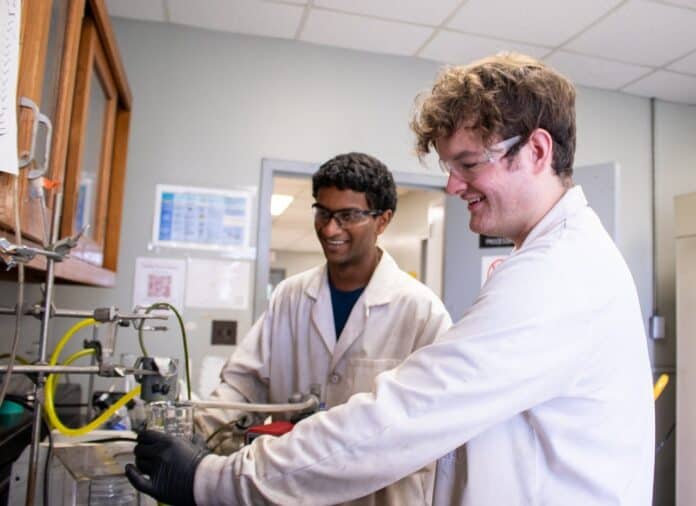Virginia Tech and the Canadian-headquartered Aclara Resources are taking a key step toward making green technology supply chains more sustainable.
A memorandum of understanding between the university and Aclara’s U.S.-based subsidiary, Aclara Technologies, lays the groundwork for a long-term academic and scientific alliance that includes Aclara’s rare earths separation pilot plant at the Virginia Tech Corporate Research Center in Blacksburg. The partnership underscores Aclara and Virginia Tech’s shared commitment to strengthening a sustainable domestic supply chain for critical heavy rare earth elements.
Heavy rare earth elements are a subset of rare earth elements that are less abundant and more difficult to extract. Known for their magnetic properties, they are considered critical minerals because they enhance clean technologies, such as electric vehicles and wind turbines, but are limited by geographically clustered supply chains. Since the 1990s, China has dominated global production of rare earth elements and currently accounts for about 99 percent of the world’s heavy rare earth element supply.
Aclara’s mine-to-magnet model aims to diversify this supply chain. The company estimates that its two South American mineral development projects could help produce approximately 5 million electric vehicles per year.
Leveraging mineral processing expertise
Virginia Tech is a national leader in rare earth element (REE) research and technology development.
In the past decade, faculty have led more than 64 federally sponsored rare earth element projects totalling over $32 million in research funding. Department of Energy initiatives – including a $10 million critical mineral research coalition in Appalachia – span the rare earth element supply chain, from resource exploration to elemental separations and refining. Since 2021, Virginia Tech faculty have filed 11 invention disclosures related to rare earths and critical minerals.
Professor Aaron Noble, head of the Department of Mining and Minerals Engineering in the College of Engineering, said partnering with Aclara will strengthen Virginia Tech’s research and development (R&D) capacity in separation technology.
“Aclara’s leadership in rare earth extraction and processing complements our department’s commitment to advancing technology and preparing future leaders in the mining industry,” said Noble, who is serving as interim head for the Department of Materials Science Engineering. “Once installed on the Virginia Tech campus, their pilot facility will bring cutting-edge industrial innovation to our doorstep while creating transformative opportunities to advance our ongoing R&D efforts in REE separations.”
The power of place in Blacksburg
Aclara’s rare earths separation pilot plant is expected to open this fall at the Virginia Tech Corporate Research Center, where it will benefit from the research park’s amenities and programming as well as proximity to the Blacksburg campus. The new facility will showcase the company’s solvent extraction technology for producing individual high-purity light and heavy rare earth elements.
To source heavy rare earth elements (HREE), Aclara manages two ionic clay rare earth projects in South America – the Carina Project in Goiás, Brazil, and the Penco Module in Chile. Both sites use Aclara’s patented circular mineral harvesting, which minimizes environmental impact by recirculating water and eliminating the need for blasting, crushing, and milling. Feedstock from the Carina Project will sustainably supply the Blacksburg facility, which aims to produce over 99.5 percent pure didymium, terbium, and dysprosium.
“Our partnership with Virginia Tech marks a strategic milestone in Aclara’s mission to address the critical vulnerability in the supply of heavy rare earths outside of China,” said Hugh Broadhurst, Aclara’s chief operating officer.
“By combining our HREE-rich feedstock and proprietary separation technology with Virginia Tech’s academic excellence, we’re delivering a concrete, integrated, independent and resilient solution to address a critical vulnerability for the United States and other countries.”
Preparing tomorrow’s workforce
In addition to providing technical support for the pilot plant, Virginia Tech brings a component that’s vital to sustained innovation: talent.
Virginia Tech currently produces 20 percent of all mining and minerals engineering graduates in the United States. The mining and minerals engineering department’s leadership-focused curriculum extends beyond the classroom through internships, student groups, competition teams, and research opportunities. Students graduate with training in mineral processing, data analytics, automation, and sustainable development. Aclara will build on that expertise by opening its pilot facility to student engagement.
“Most importantly, it will provide a unique platform for hands-on training and experiential learning – hallmarks of the Virginia Tech educational experience and essential for the next-generation REE workforce,” said Noble. “This collaboration is a bold step that aligns research, education, and innovation to tackle some of the most pressing challenges in the mining industry.”
Research and training at Aclara’s state-of-the-art facility will enhance workforce innovation bidirectionally by giving students a jump-start on their careers and helping Aclara shape the technical skills of future industry leaders.
Advancing innovation through partnership
Aclara and Virginia Tech plan to establish a collaborative framework that gives students and faculty access to piloting facilities, fosters research and job opportunities in rare earths separation technology, and connects Aclara to new research and future talent.
Virginia Tech has a strong record of forming industry partnerships that produce highly qualified talent and market-ready solutions for a rapidly changing world.
“We are thankful for Virginia Tech’s partnership and support and look forward to a long-term alliance that advances innovation, talent development, sustainable technology, and scientific leadership,” said Broadhurst. “This is just the beginning of something truly meaningful and a game-changer in the supply of HREE.”
By Suzanne Miller


